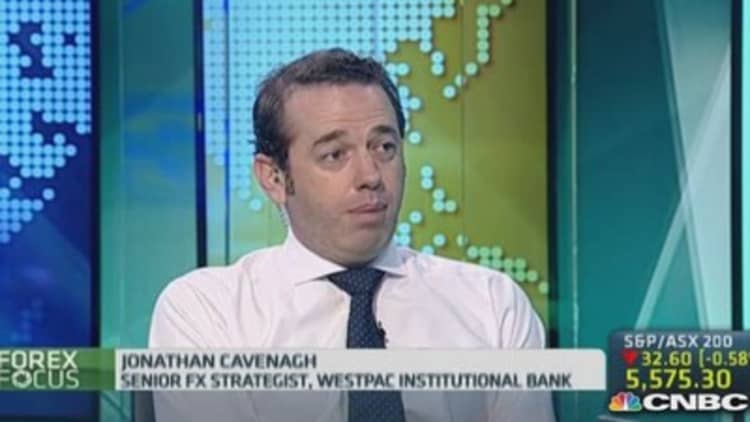Recent weakness in emerging market currencies has sparked worries that they could face a bout of pain reminiscent of last year's sell-off, analysts told CNBC.
"Everything seems to be going against emerging market currencies right now," Nizam Idris, currency analyst at Macquarie told CNBC, highlighting a number of headwinds including U.S. dollar strength, China growth worries and structural issues.
Ratings agency Moody's put Brazil's credit rating on negative watch on Tuesday citing tepid economic activity, deteriorating government accounts and declining investor confidence, triggering a sell-off across Latin American currencies. Concerns about U.S. interest rates exacerbated the decline; both the and the Colombian peso have lost around 2 percent against the dollar since Monday.
Read MoreChina to become largest economy by 2024
"The Brazilian real, Colombian peso and Chilean peso all got smashed - I think it sends a message that emerging market and commodity currency rating is probably at the end of that up-cycle," Idris said.
Dollar strength
Most currencies weakened against the U.S. dollar early this week after research from the San Francisco Fed indicated that the central bank may raise rates sooner than investors expected.
"Overall if we do get a scenario where the dollar strengthens more broadly - and we do see that - then it will be pretty hard for most EM currencies to remain resilient... But we don't see as an aggressive sell-off as we saw last year," said Dominic Bunning, currency strategist at HSBC.
"The fact that we are seeing this in countries like Brazil is an indication that some of the broader pressures are building on emerging market currencies because of what's happening in the external picture," he added.

The China factor
"The second part of the argument for weaker EM is probably China," Idris said, noting the debate about whether China faces a hard landing will likely continue.
Investors remain concerned about slowing growth in the world's second-largest economy after gross domestic product growth slowed to 7.4 percent on year in the first quarter. Despite above-view growth of 7.5 percent in the second quarter mixed data on the manufacturing sector, industrial output and retail sales have raised speculation about potential stimulus from the Chinese central bank.
"If we do get weak data out of China, then commodity prices and currencies will come under pressure," Idris added.
Idris told CNBC Dollar strength has been the main driver of EM currency weakness thus far but said we could soon see a shift to domestic fundamentals meaning there will be more differentiation in the currency moves. He noted that the Malaysian ringgit, New Zealand dollar and Indonesian rupiah would likely come under greater pressure.
Read MoreAre emerging market equities finally catching up?
Asia vs Latin America
Asian currencies could fare better than their Latin American equivalents in the event of a broader sell-off, Bunning said.
"For a lot of Asian currencies interest rate differentials are a lot higher than they were in the last Fed rate hiking cycle in 2004, whereas in Latin America the interest rate differentials aren't as positive as they were in the past, so that's one aspect that favors Asian currencies versus some others in emerging markets," he added.
Bunning also said that the dynamics of many Asian emerging market economies have shifted somewhat over the past year, relative to where they were during the time of last year's taper tantrum induced sell-off.
Fundamentals in India, for instance, have improved due to increased foreign direct investment and a narrower current account deficit, Bunning said. Thus a repeat of the Indian rupee's 26 percent decline against the U.S. dollar last year is unlikely.
Conversely, some emerging market currencies which weren't as vulnerable last year have become more vulnerable, he said, highlighting the Malaysian ringgit due to the country's smaller current account surplus on a historical basis.
Indonesia's rupiah, which was hit hard last year, remains vulnerable due to the country's widening current account deficit, while the Philippine peso and Thai baht are still vulnerable but to a lesser degree, he added.
Read MoreCalls to scoop up emerging market assets grow louder


